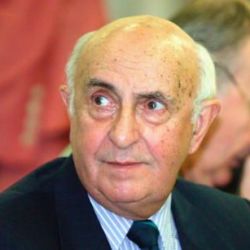Human Rights Law Marches into New Territory, The Enforcement of International Human Rights Law through International Criminal Tribunal. Lecture in memoriam Marek Nowicki
“In 2008, it is particularly suitable that I am sitting here and delivering this lecture in Warsaw, because no country more than Poland suffered from the atrocities of foreign occupation during the Second World War. Poland’s love of freedom throughout centuries is second to none” – these were the first words pronounced with great honor by Professor Theodor Meron on November 29 lecture, 5. lecture in memoriam Marek Nowicki, organized jointly by Helsinki Foundation for Human Rights (HFHR), Open Society Institute and the Polish Red Cross. Marek Nowicki was the famous opposition leader, member of the Helsinki Committee and the President of the HFHR in years 1989 – 2003. Dean of the Faculty of Law as well as the Rector of the Warsaw University were patrons of this event.
Professor Theodor Meron, citizen of the United States, but of Polish origin born in 1930 in Kalisz, a leading scholar of international humanitarian law, human rights, and international criminal law on a global scale and currently judge on the Appeal Chamber of the International Criminal Tribunal for former Yugoslavia (ICTY), and former President of ICTY.
Danuta Przywara, President of the Helsinki Foundation for Human Rights opened the lecture and presented to the audience Prof. Theodor Meron. The lecture were attended by wide range of interesting audience: professors of the Warsaw University, representatives of international organizations, employees and volunteers of HFHR, students of the Warsaw University and other schools in Warsaw.
Prof. Theodor Meron highlighted issues on jurisdiction of the International Criminal Tribunals, due process and procedural rights, lawfulness of arrests, the right to self-representation, substantive norms, the case of torture, the case of rape, common Article 3 of the Geneva Convention and the principle of legality, the case of enslavement, the case of persecution and other inhumane acts. All the themes were supported with case law coming from self-experience and good argumentation that was given to the audience.
Particularly the critical role of the ICTY was underlined and once again reminded to all about the Court’s explanation on the fundamental rights that are applicable during the time of war.





